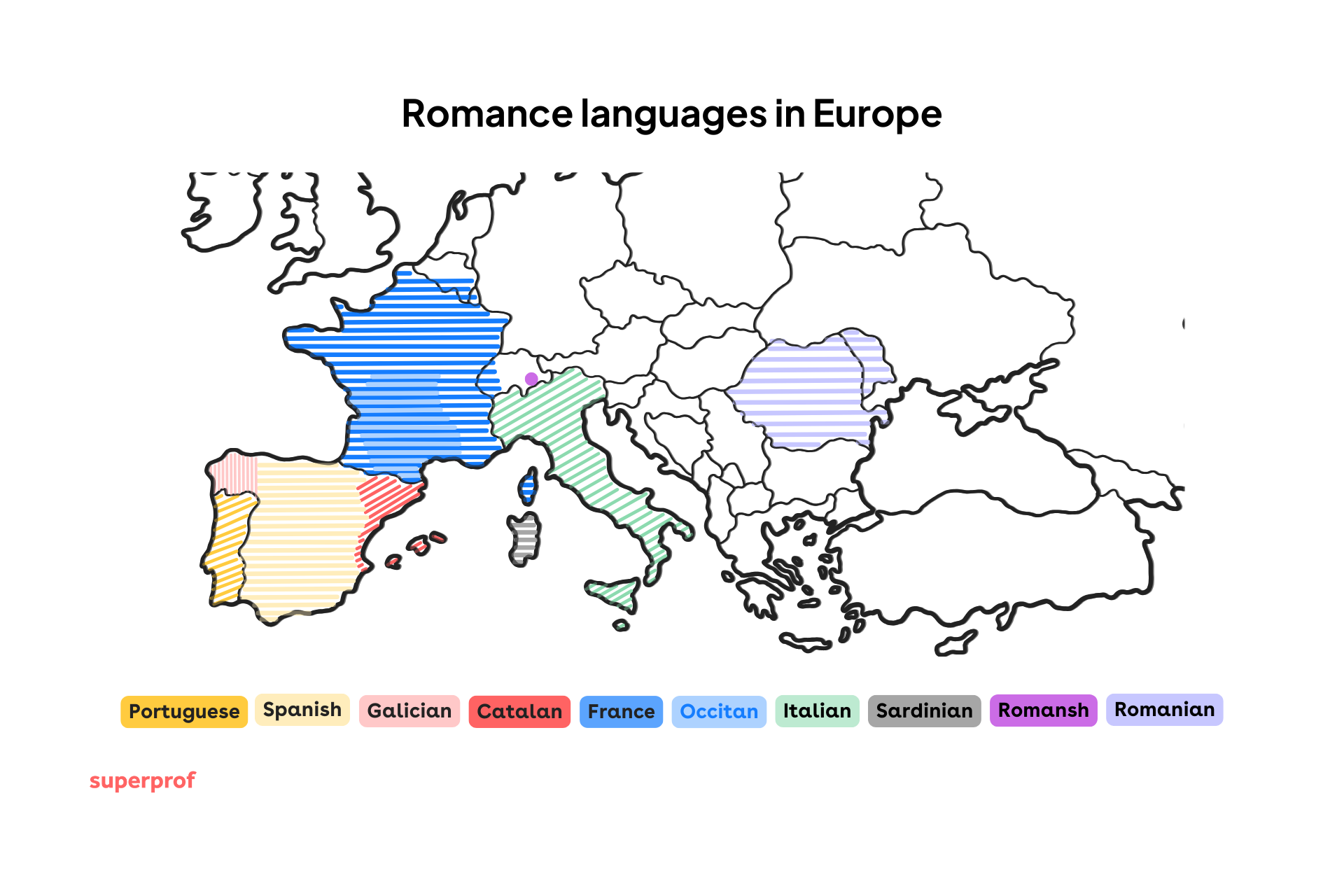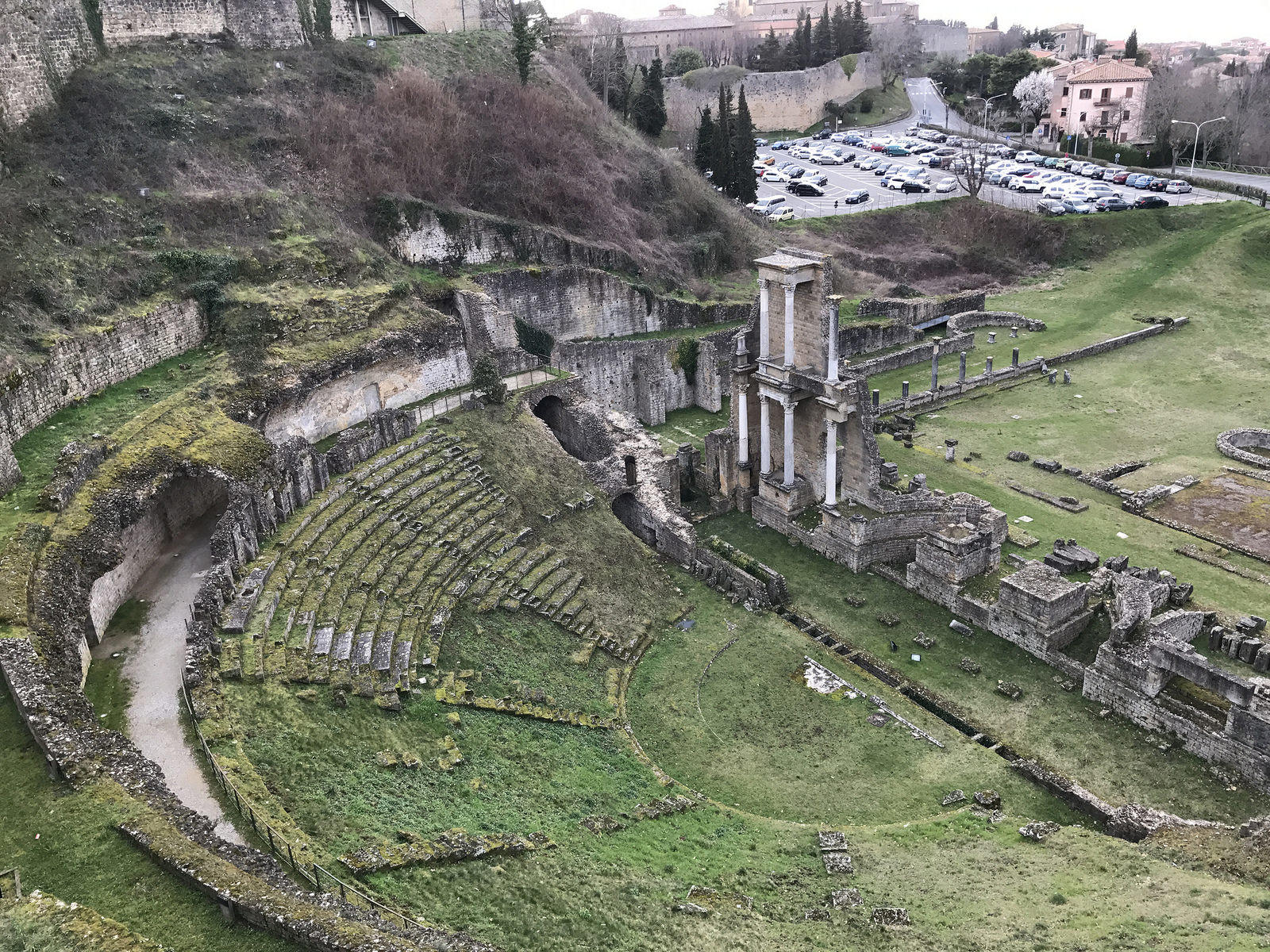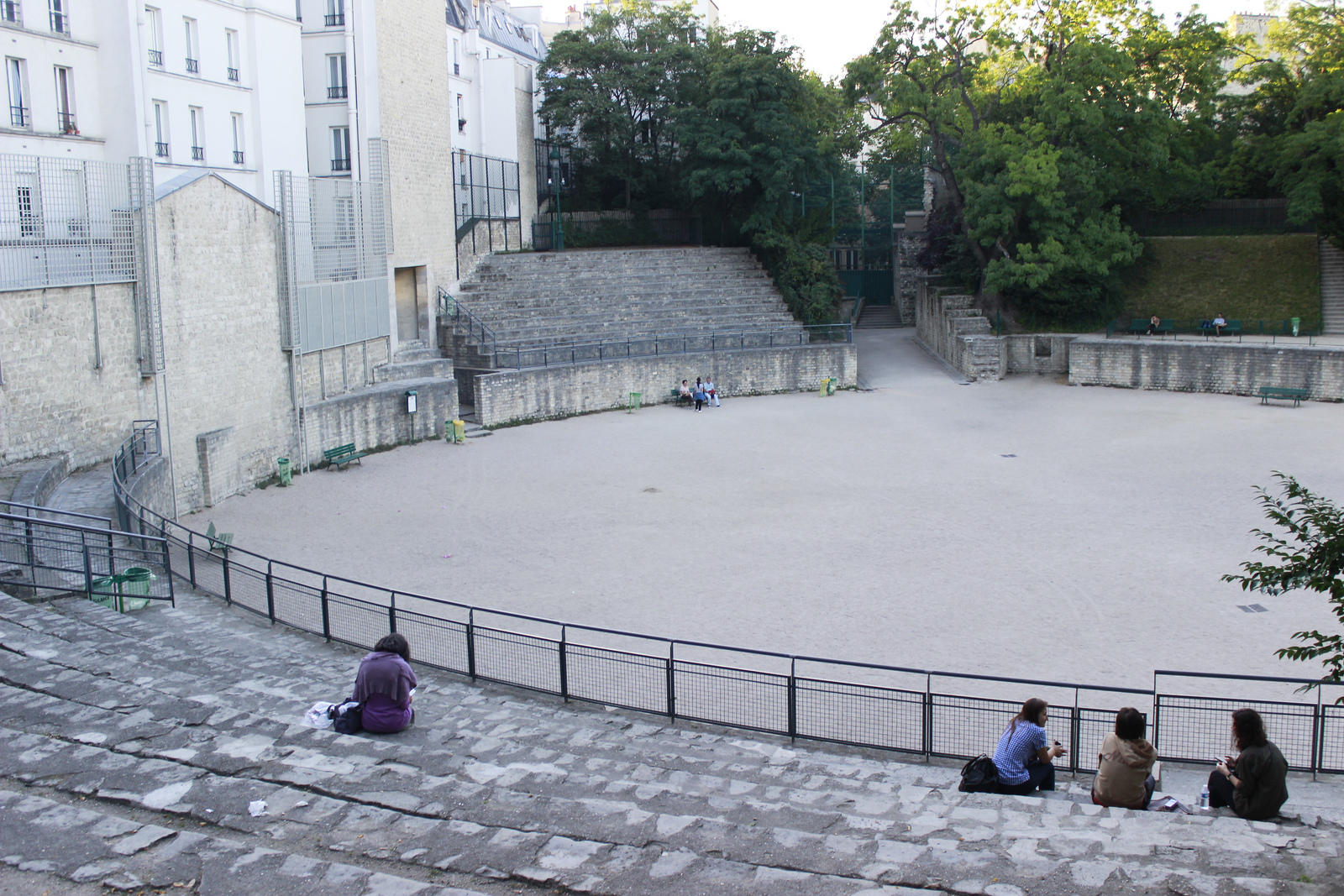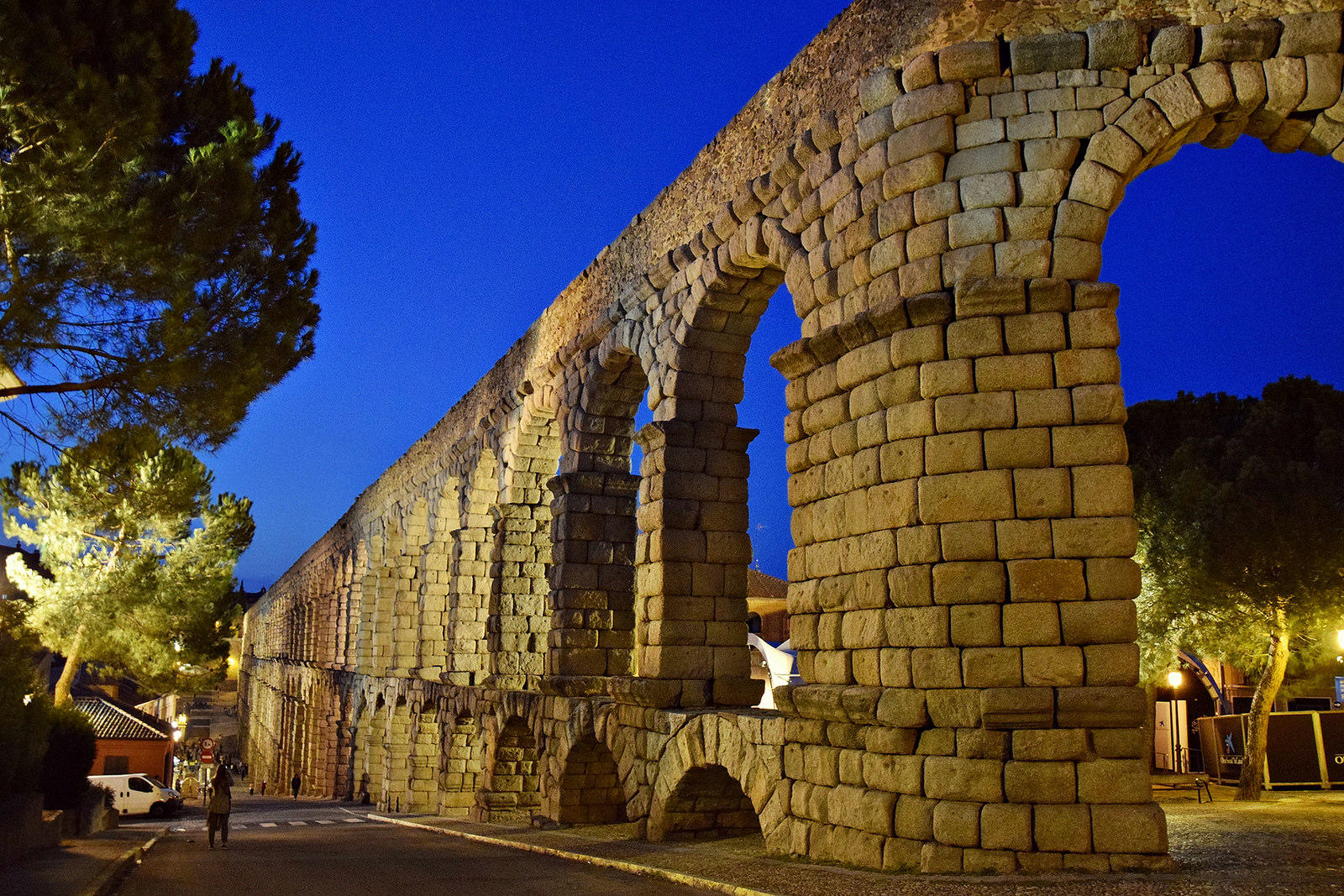Viewed freely, the English language is the accretion and growth of every dialect, race, and range of time, and is both the free and compacted composition of all.
Walt Whitman
Romance languages are languages derived from Latin. To be more precise, they derived from Vulgar Latin, which is what the people spoke and was the way they communicated. Vulgar Latin changed in different ways in each area until it finally resulted in the languages we know today.
The term “Romance” refers to the geographical region called Romania, the northwestern European part of the ancient Roman Empire. The word “Romania” derives from the word romanus (meaning “Roman”).
These are the languages derived from Latin used in Europe:


Romance Languages
Romance languages are the descendants of Latin, the language of the Roman Empire. These languages, which developed from Latin either directly or indirectly, are spoken across a vast geographical area once under Roman rule. Linguists classify them into two main categories: the Eastern Romance languages and the Western Romance languages.
English, in which 30% of all nouns, verbs and adjective are inherited from Latin, isn't a romance language.
Yet, with over a billion people speaking Romance languages today, can Latin truly be called a "dead" language? Superprof offers an excellent way to explore these languages and their Latin origins further.
Latin, Ancestor of the Italian Languages
Latin, the vehicular language of the Roman Empire, was born in the Latium, a region in central Italy. The Roman civilization rose thanks to its incredible capacity to learn and imitate the technics and knowledge originating from other regions in the Italian peninsula, notably from the Etruscans.

When the Romans imposed Latin as the universal language of the Empire, many italic languages were still spoken in Italy:
- Oscan
- Umbrian
- Volscian
- Marsian
- Sabine
- South Picense
Now there is English to Latin translation help for those who are trying to learn an ancient language.
The dominium of the Roman Empire generated a Latinization of the Italian peninsula and many of those dialects stopped being used while other survived. The Italian language belongs to the Italo-Dalmatian language family which also includes Sardinian, Tuscan, Venetian, Istian, Calabrese, Sicilian and Corsican. All of the Italic languages have roots in Greek (Greeks had many colonies in Italy), but most of their origins come from Latin. Many of the dialects mentioned above still survive today and are classified as Romance Language. While the official language of Italy was only set when the country unified in 1861, many other Italian dialects have a consequent number of native speakers.
| Language | Native speakers | Dialects of the language |
|---|---|---|
| Italian | 60,000,000 | Tuscan |
| Central Italian | 5,700,000 | Romanesco, Sabino, Marchigiano |
| Neapolitan | 3,000,000 | Abruzzese, Cosentino, Bari |
| Sicilian | 4,700,000 | Salentino, Souther Calabrian |
The North of Italy was mainly influenced by French and Spanish languages when the South of Italy mainly took after Romance languages and is closely linked to Romanian. This duality amongst Italian languages can be used to trace a border between the Western and Eastern Romance languages. That line separates Cisalpine Gaul (in the North part of Tuscany) from the rest of Italy until the Roman conquered the valley of the Po River. North of that line are the Western Italic dialects such as Venetian, Lombard or Ligurian while South of the line are the Eastern Italic dialects such as Tuscan (the standard Italian), Neapolitan or Sicilian. North and West of that line, consonants of Latin words were removed while in the South they were kept intact.
The word fire, focum in Latin became fuoco in standard Italian, foc in Romanian, fuego in Spanish or feu in French.
The Main Western Romance Languages
The three main Romance languages that have survived and thrived in Western Europe are French, Spanish, and Portuguese. These languages evolved from Latin, the language of the Roman Empire, and have since developed into distinct linguistic systems with their own rich histories and cultural significance.
French
Spanish
Portuguese
French
Gaul was invaded and conquered by Julius Caesar, (100-44BC). Consequently, the French language, like any of the other Romance languages, evolved from Latin while assimilating words from the Gaulish, Frankish or Germanic languages. Even though the French language was standardized as soon as the 16th century, two major romance dialects coexisted in France.
The Oïl language in the North, the Occitan language in the South, and the Franco-Provencal language in the Southeast of France, North of Italy and in Switzerland.
Many French words, some of which made their way to English, have a Latin locution and phonemes dating from the Antic Rome. Latin has continually evolved over time and has even led to proverbs that have lasted to today.

The Oïl Language
The oïl language includes many dialects (Berrichon, Bourguignon, Morvandiau, Champenois or Campanois, Franc-Comtois, French, Lorrain, Norman, Picard, Poitevin and Saintongeais, Walloon, Angevin, Manceau, Mayennais) many of which are almost dead and only have a handful of native speakers.
The Occitan Language
The Occitan language includes other idioms originating from Latin and mostly spoken in the Southern Tier of France, the region once called Occitanie. It includes:
- Gascon: includes the Béarnese and Aranese (spoken in Spain).
- Languedocien (lengadocian)
- Limousin (lemosin)
- Auvergnat (auvernhat)
- Provençal (provençau or prouvençau), including the Niçard subdialect.
- Shuadit language
- Vivaro-Alpine (vivaroaupenc), also known as "Alpine" or "Alpine Provençal", and sometimes considered a subdialect of Provençal
The Occitan language is the most spoken regional language in France and still counted around 800,000 native speakers in 2012. Other regional languages still spoken in France include Breton and Alsatian but neither are Latin since the former is of Celtic origin while the later is of Germanic origin.
Spanish and Portuguese
The Iberian Peninsula was conquered by the Romans in 228BC. There, vulgar Latin that emerged after the Roman colonization gave way to many other dialects:
- Castillan
- Catalan
- Andalusian
- Extremaduran
- Murcian
- Aragonese
- Galician
- Portuguese
After the fall of the Empire, the Iberian territories were conquered by Berber soldiers coming from North Africa. From the 8th century up until the Treaty of Grenada which was signed in 1491, the Iberian peninsula was home to a large population of Umayyads and Arabs. Castillan (the official language of Spain) was greatly influenced by 700 years of cohabitation with Arabic languages. Catalan, which is spoken in Catalonia (region of Barcelona) is derived from the French Occitan language and is often easier for French-speaking people to understand.

In Portugal and Spain, the Latinization process was fairly swift according to historians. The huge number of soldiers and civil servant that the Roman Empire dispatched to the newly conquered territories of Iberia seem to have been the main factor for this.
Latin easily took over the local dialects and the indigenous population, generation after generation, slowly forgot their native languages (Celtic, Iberian, Leonese, Cantabrian, Vascones).
Some dialects successfully survived to the Roman Empire. The Basque language still is spoken today in both France and Spain in the region of the Pyrenees is not part of the Romance language since its grammar doesn't come from Latin. Scholars are still trying to figure out where this language came from.
Checkout the many reasons on why you should learn Latin.
The Eastern Romance Languages
One language sets you in a corridor for life. Two languages open every door along the way.
Frank Smith, phycholinguist
The Eastern part of the Romance languages includes four languages derived from Latin which are spoken in Romania and Moldavia:
- Daco-Romanian
- Istro-Romanian
- Aromanian
- Megleno-Romanians
According to linguistic rules, Latin vocabulary incorporated in the Albanian and Greek languages is also to be considered an Eastern Romance language. These four languages originate from the Romanian dialects that were spoken before the rule of the Roman Empire on the regions north of the Jirecek line, which delimits the area of influence of the Romans until the 4th century AD. These regions included the current countries of Romania, Moldavia, Albania, Serbia, Bosnia and Croatia.
Because Latin in the mother of all Romance languages, to learn Latin will greatly help you in learning any of Indo-European languages.
According to certain theories, the presence of Roman forces in Romania explains why the country kept speaking a Latin-derived language when all its neighbor use Slavic dialects. What is uncertain is where the Romanian language first appears and more exactly on which side of the Danube River, in Dacia, Macedonia, Moldavia, or south of the Danube.
Linguists are still searching for an answer, but you can find the origins of Latin letters here. Romanians use the Latin alphabet and the Romanian language shares with Latin many similarities in phonemes, phonology and grammatical rules. 71% of all Romanian nouns, verbs and adjectives come directly or not from Latin which explains why Italian and Romanian are very close languages.
In conclusion, the Romance languages, deeply rooted in the legacy of Latin, reveal fascinating insights into how culture, conquest, and migration have shaped modern languages. From the Roman Empire's influence in regions like Romania to the shared linguistic characteristics across Italian, French, Spanish, Portuguese, and Romanian, these languages continue to connect us to a rich historical past. If you’re inspired to explore the foundations of these languages further, studying Latin is an excellent starting point. With platforms like Superprof, you can find expert tutors to guide you through Latin’s declensions and grammar, helping you unlock the secrets of Romance languages and enhance your understanding of their grammar, vocabulary, and evolution.
Start your linguistic journey today and uncover the timeless appeal of Latin!
Summarize with AI:















